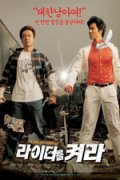
Break Out (aka: Spark the Lighter)
Rating: 7/10
Year: 2002
Genre: Comedy
Director: Jang Hang-Joon
Cast: Kim Seung-Woo, Cha Seung-Won, Kang Sung-Jin, Park Young-Kyu
In Korea, comedy is not made merely for generating laughter, it is a device to criticize. The target can be the society, the government, or any individual affairs. Films like Attack the Gas Station and Foul King are good examples that utilize the device of comedy to mock the society and express the dissatisfaction of the people. Break Out is no exception. At first glance, the plot may seem outrageously illogical and silly, but if you try to examine it in depth, you will find out that it is not as nonsense as you thought.
The story of this film is quite funny. Kim Seung-Woo is an unlucky fellow who owns nothing except a cheap lighter. Unfortunately, this lighter is "stolen" by Cha Seung-Won, a gang boss, by accident. Cha refuses to return the lighter to Kim, but Kim has made up his mind to get back his lighter at all cost. He chases after Cha and gets on a train... In an ostensible sense, the plot is similar to Hollywood blockbusters Executive Decision or Speed, the protagonist is the hero responsible for the safety of the passengers, however, the essence of the story and the spirit of the character are very different. Certainly, in terms of the production level, this film possesses a strong "Hollywood" look. No matter the narrative structure, the use of camera angles, or even the employment of computer special effects, everything comes close to Hollywood standard. Intense and climactic moments are well calculated.
To me, what is interesting about this film is not the gags, but all the symbols and metaphors behind the story. It seems that the filmmaker is very disappointed with the government. Starting from the beginning, the reserve training camp scene already criticizes severely how the government fails to respect the will of the citizens. In the middle, the friendship of the cop and gang leaders also signifies the impotence of the corrupted law enforcement department. But that is not the funniest part. The most decisive comment is the symbols carried out by the characters. The character of Kim Seung-Woo and all the passengers are actually the representatives of the citizens at the bottom of the bureaucracy. They are not greedy at all. Take Kim as an example, he only wants to get his cheap lighter back and has a nice cigarette. But he is always ignored by the gang boss Cha Seung-Won, a symbol of the middle class government official. The way Cha ignores Kim may parallel to the way the government ignores the need of the citizens. He (They) does not know that if he keeps rejecting Kim's demand, the outcome can be very serious. The outburst of the timid passenger in the middle also reminds us that even the calmest person can get mad if he is under heavy pressure. On top of Cha is the senator. In the filmmaker's eyes, this senator is definitely a scumbag. He is cold blooded, greedy and hypocritical. As compared to Cha who still loves his family and shows some emotions, this senator, who belongs to the adminstrative class of the bureaucracy, is actually the real criminal behind all the trouble. (Little spoiler) Ironically, his "mask" is still not uncovered at the end. His power and reputation remains, while it is still, as usual, the middle class that receives punishment.
The two protagonists Kim Seung-Woo and Cha Seung-Won have both done a great job, especially Kim Seung-Woo. His portrayal as the stupid but courageous man is very funny. It is no wonder why he is nominated a Blue Dragon award (the category for Best actor) with this film. Some of the supporting actors are also impressive, including Kang Sung-Jin, who has also appeared in films like Attack the Gas Station. His role as the talkative passenger is highly humorous.
Break Out is an entertaining flick. The critiques and metaphors are very incisive and cynical. The only problem is that, the filmmaker tries too hard to imitate Hollywood style, that the whole film lacks real surpise and peculiar ideas. It does not reflect the color of Korean cinema as films like Christmas in August or Foul King. It seems that even if the cast is not Korean but white or even black actors, the plot can also work well without a problem.
Cool guy(s) - Kim Seung-Woo
Reviewed by: Kantorates